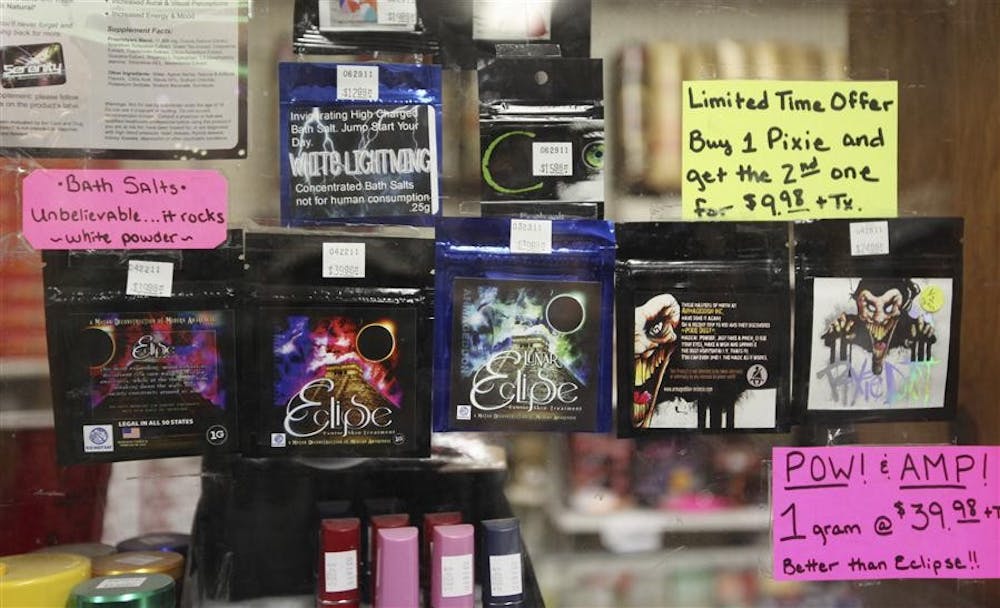Bloomington Police Department officials received a tip last August: a local retailer was possibly involved with selling synthetic substances — drugs such as those labeled “spice” or “bath salts,” often sold in small packets for between $20 to $50, typically labeled “not for human consumption.”
Officers obtained a sample and, in compliance with protocol, BPD sent it away for analysis. The results came back revealing the sample’s legality.
Had the sample been retrieved in September, it could have been deemed illegal, and Bloomington law enforcement could have taken appropriate action.
“Unfortunately, it didn’t become ‘illegal’ until September,” BPD Captain Joe Qualters said in an email. “Which means that is was legal at the time law enforcement obtained it.”
Cases like this, he said, illustrate an inefficiency in the current law.
Indiana’s current synthetic drug laws grant the state’s Board of Pharmacy the authority to impose emergency rules that criminalize certain chemicals commonly found in synthetic drugs. The only stipulation is that the Drug Enforcement Agency or another state has to have scheduled a rule or have criminalized the substance first, Indiana Board of Pharmacy Director Gregory Pachmayr said.
“As I understand it, there are some challenges in enforcement of current law due to manufacturers slightly changing the chemical makeup of these substances to keep them ‘legal,’” Qualters said.
The Board of Pharmacy works closely with the Indiana State Police Lab and other stakeholders, Pachmayr said, and the board conducts its own research to develop the emergency rules.
Since the board was granted the ability to do so, it has exercised its ability to create emergency rules three times since August 2012. Most recently, the board added nine materials, compounds and mixtures to its list of outlawed substances in a rule filed Jan. 17.
Qualters said officers regularly encounter individuals who use synthetic drugs, and officers have responded to several burglaries at establishments known to sell them.
“We know that the demand is high,” he said.
Qualters also said lives can be potentially devastated by the effects caused by the drugs. According to the Office of National Drug Control Policy, the effects of synthetic marijuana can be as mild as “agitation” or as severe as rapid heart beat, tremors and seizures.
Bath salts can cause extreme paranoia and hallucinations, which can result in violent behavior toward the user or those around him.
Sen. Jim Merritt, R-Indianapolis, said he was alarmed by the accessibility of synthetic drugs within his Indianapolis district. The substances, he said, could be found at various independently owned gas stations in the area.
Like Qualters, Merritt said he sees flaws in the current legislation.
Every time a compound found in synthetic drugs is added to a list of banned substances, retailers pull them from the shelves, drug makers alter the recipe and vendors get away with selling it, he said.
Last September, Attorney General Greg Zoeller addressed state business owners in a letter, warning them of the risk vendors run by selling synthetic drugs.
“The purpose of this letter is to put you on notice that my office will aggressively pursue civil remedies against any person or business involved in the sale of these dangerous substances,” Zoeller said.
The letter was one of many steps Indiana officials have been taking in the fight against what Merritt called a “scourge on society.”
In 2010, Merritt began working on a proposal to expand the definition of synthetic substances. Senate Bill 536 was approved Jan. 29 by Indiana’s Senate Committee.
The bill proposes an expanded definition of a “synthetic drug” that builds on the current legislation. If passed, the new definition would not rely on chemical components to classify a substance as a “synthetic drug.”
According to Merritt’s proposal, if a reasonable person would believe a substance to be a synthetic drug, it should be classified as such.
Merritt said he believes the bill will be passed into law with relative ease by July.
Until then, law enforcement agents will continue to crack down on synthetic drug use to the fullest extend of the law, Qualters said.
“Our efforts will continue,” he said. “But our hope is that current laws can be expanded or become more clearly defined so that enforcement can be easier and more timely.”
Officials seek to broaden definitions

Get stories like this in your inbox
Subscribe





